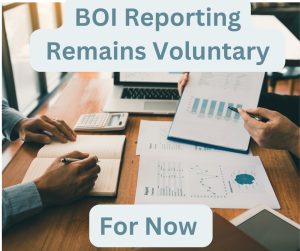The landscape on the requirements for reporting under the Corporate Transparency Act has changed again.
The requirement that companies report Beneficial Ownership Information (BOI)—details about people who are senior officials and/or own at least 25% of the company—to the U.S. Financial Crimes Enforcement Network (FinCEN) remains voluntary for now. That’s despite the U.S. Supreme Court’s stay of a nationwide preliminary injunction that suspended enforcement of the act and its implementing regulations.
While staying that injunction, issued in December in the U.S. District Court for the Eastern District of Texas and appealed to the U.S. Court of Appeals for the Fifth Circuit, the Supreme Court did not address a separate stay of the effective date of the reporting rule, issued by a different judge on January 7 in the same eastern Texas district.
“Reporting companies are not currently required to file beneficial ownership information with FinCEN despite the Supreme Court’s action” on the December injunction, and thus they’re not liable if they do not file BOI, as long as the second stay remains in force, according to a statement that FinCEN posted online on January 24.
When a federal judge in Alabama struck down the Corporate Transparency Act in a separate ruling earlier this year, in a case brought by the National Small Business Administration, NSBA CEO and President Todd McCracken estimated that the Corporate Transparency Act could cost small businesses $8,000 per year—and asserted that the act unfairly targeted them.
“This [Alabama] ruling justifies the concerns of millions of American businesses about how the CTA is not only a bureaucratic overreach, but a Constitutional infringement,” he said. “The judge’s decision is an opportunity for Congress to go back to the drawing board and find a solution that will truly protect Americans from bad actors. The CTA simply will not accomplish the goal of stemming money-laundering—what it does is overstep the bounds of privacy, the law, and common sense at the expense of America’s small businesses.”
Now that the Supreme Court has lifted the first stay from the December case in Texas, it’s possible that FinCEN will next ask the district court or Fifth Circuit to lift the second stay related to the effective date. If that were to happen, FinCEN in all likelihood would set a new timeline for companies that haven’t yet filed BOI reports to do so. Although it’s entirely possible the Trump Administration could delay that timeline, given its overall effort to review pending rules.
But given the possibility that the current state of play could change—either temporarily due to the pause being lifted, or permanently due to an adverse court ruling—businesses should remain actively informed and stay up-to-date on ongoing developments. They should monitor ongoing litigation and FinCEN’s statements closely, collect BOI information so that they’re ready to file it if the requirement goes into effect—and contact us as your Chicago small business attorney with any questions or counseling requests.
 Chicago Business Attorney Blog
Chicago Business Attorney Blog


